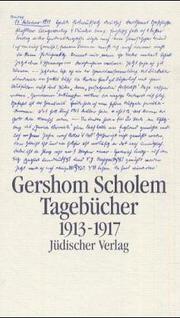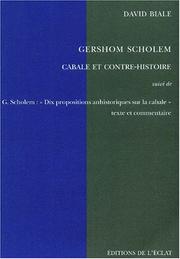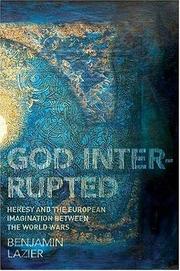| Listing 1 - 6 of 6 |
Sort by
|
Book
ISBN: 9782851971586 2851971581 Year: 2009 Volume: 92 Publisher: Paris: L'Herne,
Abstract | Keywords | Export | Availability | Bookmark
 Loading...
Loading...Choose an application
- Reference Manager
- EndNote
- RefWorks (Direct export to RefWorks)
Scholem, Gershom --- Jewish philosophy --- Philosophie juive --- Scholem, Gershom, --- Scholem, Gershom Gerhard, --- Jewish scholars --- Scholars, Jewish --- Scholars --- Scholem, Gershom Gerhard, - 1897-1982

ISBN: 3633540911 363354139X Year: 1995 Publisher: Frankfurt am Main Jüdischer Verlag
Abstract | Keywords | Export | Availability | Bookmark
 Loading...
Loading...Choose an application
- Reference Manager
- EndNote
- RefWorks (Direct export to RefWorks)
Scholem, Gershom --- 296*4 --- Joodse mystiek --- 296*4 Joodse mystiek --- Jewish scholars --- Jews --- Judaism --- Scholars, Jewish --- Scholars --- Religions --- Semites --- Civilization, Jewish --- Jewish civilization --- Civilization, Semitic --- Civilization --- Religion --- Scholem, Gershom, --- Scholem, Gershom Gerhard (1897-1982) --- Savants juifs --- Journaux intimes --- Allemagne --- Israël

ISBN: 2841620557 9782841620555 Year: 2001 Publisher: Nîmes: Éditions de l'éclat,
Abstract | Keywords | Export | Availability | Bookmark
 Loading...
Loading...Choose an application
- Reference Manager
- EndNote
- RefWorks (Direct export to RefWorks)
Mysticisme --- Savants juifs --- Judaïsme --- Historiographie. --- Scholem, Gershom Gerhard, --- Mysticism --- Jewish scholars --- Judaism --- Historiography --- Judaïsme --- Scholem, Gershom, --- Mysticism - Judaism - Historiography --- Jewish scholars - Germany - Biography --- Jewish scholars - Israel - Biography --- Scholem, Gershom Gerhard, - 1897-1982
Book
ISBN: 9782070337866 2070337863 Year: 2006 Volume: 481 Publisher: Paris : Gallimard,
Abstract | Keywords | Export | Availability | Bookmark
 Loading...
Loading...Choose an application
- Reference Manager
- EndNote
- RefWorks (Direct export to RefWorks)
History --- Histoire --- Philosophy --- Philosophie --- Rosenzweig, Franz, --- Benjamin, Walter, --- Scholem, Gershom, --- Rosenzweig, Franz (1886-1929 ) --- Benjamin, Walter (1892-1940 ) --- Scholem, Gershom Gerhard (1897-1982 ) --- Messianisme juif --- Critique et interprétation --- 1900-1945

ISBN: 1400837650 128296478X 9786612964787 9781400837656 9780691136707 069113670X 6612964782 0691155410 9781282964785 9780691155418 Year: 2010 Publisher: Princeton, NJ
Abstract | Keywords | Export | Availability | Bookmark
 Loading...
Loading...Choose an application
- Reference Manager
- EndNote
- RefWorks (Direct export to RefWorks)
Could the best thing about religion be the heresies it spawns? Leading intellectuals in interwar Europe thought so. They believed that they lived in a world made derelict by God's absence and the interruption of his call. In response, they helped resurrect gnosticism and pantheism, the two most potent challenges to the monotheistic tradition. In God Interrupted, Benjamin Lazier tracks the ensuing debates about the divine across confessions and disciplines. He also traces the surprising afterlives of these debates in postwar arguments about the environment, neoconservative politics, and heretical forms of Jewish identity. In lively, elegant prose, the book reorients the intellectual history of the era. God Interrupted also provides novel accounts of three German-Jewish thinkers whose ideas, seminal to fields typically regarded as wildly unrelated, had common origins in debates about heresy between the wars. Hans Jonas developed a philosophy of biology that inspired European Greens and bioethicists the world over. Leo Strauss became one of the most important and controversial political theorists of the twentieth century. Gershom Scholem, the eminent scholar of religion, radically recast what it means to be a Jew. Together they help us see how talk about God was adapted for talk about nature, politics, technology, and art. They alert us to the abiding salience of the divine to Europeans between the wars and beyond--even among those for whom God was long missing or dead.
Gnosticism --- Pantheism --- Heresy --- Jewish philosophy --- God (Judaism) --- Cults --- Philosophy --- Religion --- Panentheism --- Heresies --- Offenses against religion --- Apostasy --- Judaism --- History --- History of doctrines --- Strauss, Leo. --- Scholem, Gershom, --- Jonas, Hans, --- Europe --- Intellectual life --- Scholem, Gershom Gerhard, --- Jews --- Philosophy, Jewish --- Philosophy, Israeli --- Shalom, Gershom, --- Sholem, Gershom, --- שלום, גרשם --- שלום, גרשם, --- שלום, גרשום --- גרשם, שלום --- Jonas, Hans, - 1903-1993. --- Scholem, Gershom Gerhard, - 1897-1982.
Book
ISSN: 02497980 ISBN: 9782711627233 2711627233 Year: 2017 Publisher: Paris: Vrin,
Abstract | Keywords | Export | Availability | Bookmark
 Loading...
Loading...Choose an application
- Reference Manager
- EndNote
- RefWorks (Direct export to RefWorks)
En explorant les sources judéo-allemandes de l'oeuvre d'Emmanuel Levinas, Sophie Nordmann met en évidence un motif récurrent chez les grandes figures de la philosophie juive contemporaine que sont Hermann Cohen, Franz Rosenzweig, Martin Buber, Gershom Scholem et Emmanuel Levinas lui-même. Pour chacun d'eux, elle montre que c'est par le recours aux sources juives qu'ils sortent de l'impasse philosophique dans laquelle ils sont pris – celle de la contradiction interne à l'éthique pour Cohen, celle du présupposé du "Tout pensable" pour Rosenzweig, celle de l'hégémonie du Cela pour Buber, celle de la conception linéaire de l'histoire pour Scholem, celle de l'enfermement dans l'être pour Levinas – et donnent corps à un projet philosophique inédit. En retour, les interprétations philosophiques qu'ils nous livrent éclairent la richesse de la tradition juive sous de multiples aspects : le monothéisme chez Cohen, le judaïsme biblique chez Rosenzweig, le hassidisme chez Buber, la Kabbale chez Scholem, le Talmud chez Levinas. Cet ouvrage enrichit et renouvelle l'interprétation de ces auteurs, en dégageant le rôle moteur que joue, chez chacun d'eux, la référence aux sources juives. Il contribue ainsi à une réflexion plus générale sur les implications d'un recours philosophique à des sources religieuses, ici celles du judaïsme.
Judaism and philosophy --- Philosophy, Modern --- Jewish philosophy --- Judaïsme et philosophie --- Philosophie --- Philosophie juive --- Lévinas, Emmanuel --- Cohen, Hermann, --- Rosenzweig, Franz, --- Buber, Martin, --- Scholem, Gershom, --- Levinas, Emmanuel, --- Philosophy --- Jewish religion --- Levinas, Emmanuel --- Scholem, Gershom Gerhard, --- Lévinas, Emmanuel, --- Judaïsme et philosophie --- Lévinas, Emmanuel --- Lévinas, Emmanuel. --- Judaïsme et philosophie. --- Rosenzweig, Franz, - 1886-1929 --- Scholem, Gershom Gerhard, - 1897-1982 --- Cohen, Hermann, - 1842-1918 --- Buber, Martin, - 1878-1965 --- Lévinas, Emmanuel, - 1906-1995
| Listing 1 - 6 of 6 |
Sort by
|

 Search
Search Feedback
Feedback About UniCat
About UniCat  Help
Help News
News